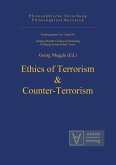Targeted killing of terrorists has become an established practice in the fight against terrorism. The disturbing consequences of the practice and its increasing political and societal acceptance raise questions as to its justifiability and its place in counter-terrorism.
Anna Goppel explores whether targeted killing of terrorists can be justified, both from a moral and an international legal perspective. She discusses moral and international legal limits to state use of lethal force and argues that the moral principles and the international legal regulations allow for the practice only in very specific, very rare, and rather hypothetical cases. The analysis is based on a thorough discussion of the human right to life, the laws and ethics of war, and the relevant moral and legal arguments. This makes it of particular interest to philosophers and legal theorists interested in terrorism, counter-terrorism, human rights, and the legitimacy of defensive state measures.
Anna Goppel explores whether targeted killing of terrorists can be justified, both from a moral and an international legal perspective. She discusses moral and international legal limits to state use of lethal force and argues that the moral principles and the international legal regulations allow for the practice only in very specific, very rare, and rather hypothetical cases. The analysis is based on a thorough discussion of the human right to life, the laws and ethics of war, and the relevant moral and legal arguments. This makes it of particular interest to philosophers and legal theorists interested in terrorism, counter-terrorism, human rights, and the legitimacy of defensive state measures.









